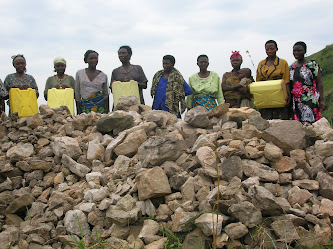Water, Sanitation and Hygiene
Visit our Facebook page to keep up to date on RRHS activities and projects: RRHS Facebook Page
RRHS -Director's Message to the people:
Sanitation and hygiene is a process that entails:
- Safe disposal of human excreta i.e. safe isolation of human excreta from the environment and hand washing after every visit to toilet.
- Safe disposal of solid and liquid waste i.e. putting waste to its final resting place in such a way that it does not endanger life and natural resources.
- Maintenance of personal, domestic and food hygiene i.e. keeping one’s body and other personal effects, his household and food preparations and storage in such a way that does not expose him to danger.
- Safe collection, storage and use of water mainly for drinking. This refers to collection of water from a safe source using safe utensils or containers, storing it safely until it is safely consumed.
- Control of insects and rodent vectors such as mosquitoes, flies and rats among others i.e. denying disease transmitting organisms any sanctuary from where it can multiply and attack a homestead.
· Sanitation is important for human health· Sanitation generates economic benefits· Sanitation contributes to human dignity and social development· Sanitation Sustains the environment
We call upon willing friends globally to supplement our efforts in improving sanitation.
“Every little bit of advice from you helps”
Send us an email at rural services60@gmail.com to learn
more.
Reflecting the real situation:
In this part of the country, like in many other developing countries, there is environmental degradation and pollution, water scarcity, and water pollution, poor housing, poor methods of waste disposal, poverty and a lot of human suffering in regard to environmental health.
RRHS- in the year 2011, received a development
grant from the Belgium Development Cooperation –Micro intervention
program (MIP). The grant was conditional to construct Rain-Water Harvesting Tanks in the area of Rukoki Sub county, Kasese
–District.-Uganda (hard to reach). View sample pictures below. You can also be the next
development partner to this project. In order to sustain this project, the beneficiaries of tanks on 30th November 2014 resolved to start a saving and credits scheme. The Development scheme is benefiting all interested persons from one Parish. Email us for details.
 |
| Researcher- in a hard to reach area, collecting data on rain water harvesting tanks build by -RRHS |
Let us together with you make clean water and safe sanitation
accessible to people in difficult to reach areas. Rwenzori Rural Health
Services a community based organization in Kasese -District Uganda, is
struggling to provide safe water to strayed areas.
Nyakabingo Water Hygiene and sanitation Project : (Gravity flow scheme)
Before
the year 2004, most people in this area were walking more than two hours
across the hills to reach a water source (Natural Water Spring) and were taking approximately 60 seconds to fill a twenty litter gallon. To overcome
the major problem of accessing clean water for domestic use, RRHS and
the community started the project by protecting three natural water
springs and joining them to increase the volume of water. This plan was
further developed by the RRHS- online project consult Mr. Jim Chapman - based in USA.
Financial resources to this project phase was Donated by Volunteers Without Boundaries -USA.
After Joining the three water springs, Volunteers without Boundaries donated funds to construct a tank of approximately 40,000 litters that supports a min gravity flow scheme.
In
the bush, across the hill, we constructed a small water collection tank
.
The small tank has three intake areas, and a provision for water
over flow. All the water from three intake sources first is collected before it
continues to the big tank below. This was done to increase pressure.
This was a very good and simple technology. Always feel free to come
and discover.
 |
| Mothers actively participated in collecting shapeless stones to build the tank. |
Before the tank was constructed, community
members collected strips of stones that were used to build the big
tank. The tank you see is built with shapeless stones.
 |
| Water reservoir tank build by RRHS/ VWB & the community. |
From this big tank, with Funds from Volunteers without boundaries - USA; we piped clean water to serve a primary school and communities along the line.
 |
| Piping water across hills and valleys was a very interesting activity. |
 |
| It was like a dream to have water at this school. RRHS has now fictionalized the plastic tank |
 |
| We piped water; across valleys and big hills. It is time for you to come and discover. |
 | ||
| At the School, we constructed a wash room for girls. The only one of it's kind in the area. Girls, during their menstrual periods, wash and continue with studies. |
 |
| RRHS -Staff training pupils to make Reusable Menstrual pads. Email us to learn more. |
Rwenzori Rural Health Services has continued to support schools in promoting public health. The picture below shows RRHS Staff demonstrating making use of a hand washing facility and emphasising on washing after every visiting a toilet, before eating and after.
 |
| Demonstrating hand washing facility at a school in Kasese-Uganda. |
 |
| RRHS is encouraging pupils to eat while at school (Mid day meals). Email us to learn more at ruralservices60@gmail.com |
 | |||||||||||||||
| RRHS Executive Director and Staff in a planning meeting |











You have discussed an interesting topic that everybody should know. Very well explained with examples. I have found a similar website<a href="https://coopersenviro.com.au/ waste oil collection, waste oil disposal visit the site to know more about coopersenviro.
ReplyDelete